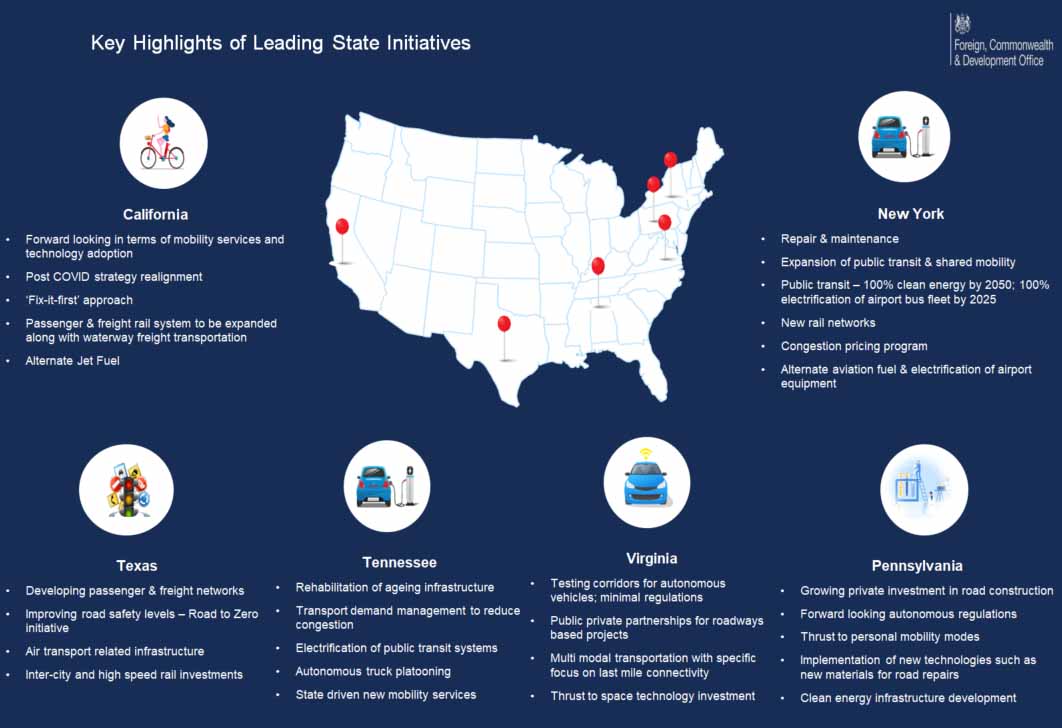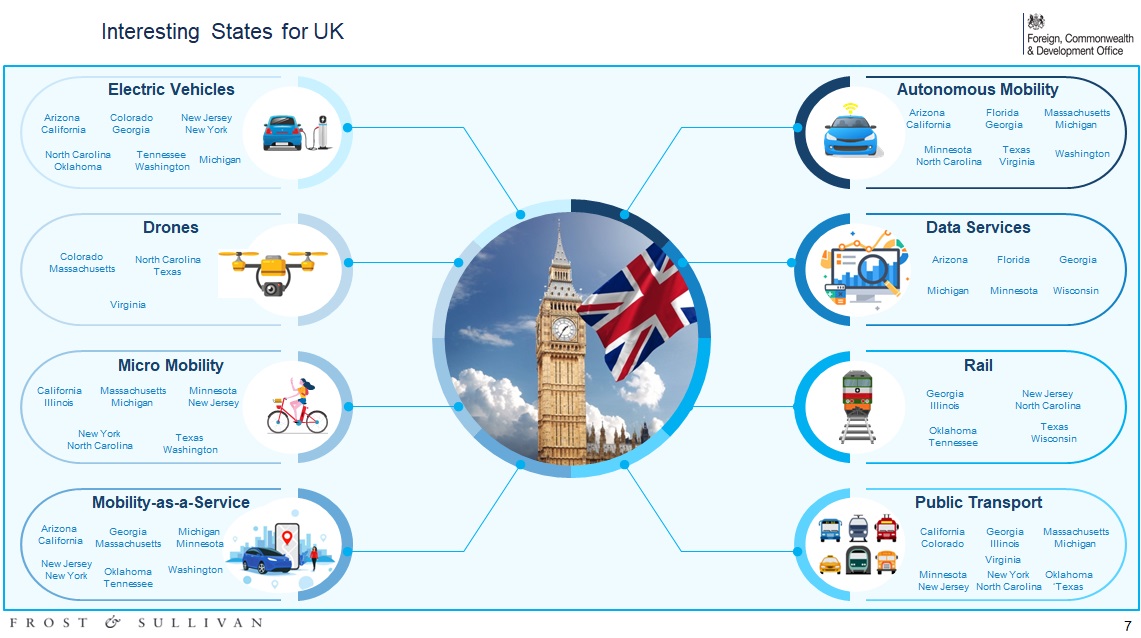The political landscape is reflecting market ambition
The significant developments across the political landscape, although not fine-tuned into detailed policies, happen to coincide with a market dynamic that is also shifting significantly.
On behalf of the British Embassy in Washington, Frost & Sullivan has been engaged in delivering a comprehensive project to understand the detailed landscape for opportunities in the transportation sector in the United States, with a focus on adoption of new solutions.
US States are looking to drive investment and technology deployment
Although there are national ambitions, it is at the State and City level that innovative solution adoption will be pushed.
Many states are looking to improve demand management by implementing intelligent transport system (ITS) and vehicle-to-everything (V2X) technology, expanding their public transit networks, and developing active transportation infrastructure and shared mobility services to increase system flexibility and efficiency.
According to Shwetha Surender, New Mobility Director at Frost & Sullivan, electrification of public transit fleets ranked high on the agenda of states like California, Florida, and New York, all connected to the net zero agenda. “More than 12 out of the 20 states researched were pushing forward on autonomous mobility plans, with California, Texas, Tennessee, Pennsylvania, and Virginia either piloting or already offering commercial autonomous mobility solutions,” she adds.

What does this demand mean for the UK?
The United Kingdom’s key focus areas are varied: building the required regulatory framework and competence in electric vehicles, autonomous mobility (roadways and marine), emerging freight and logistics technology modes (e.g. drones), micro-mobility, mobility-as-a-service, and data services. In evaluating the United Kingdom’s competencies against the United States’ transportation roadmap, the United Kingdom appears well-positioned to offer technical support in areas such as electric and autonomous vehicles, integrated mobility, active transportation modes such as micro-mobility, and freight infrastructure development across modes.

UK stakeholders to strategically target states
The evident synergies between the UK’s competencies in transport technology, policy, and regulations and the need of the 20 US states to develop, adapt and future-proof their transportation economy is a connection of substance to add to the construct of the ‘special relationship’.
Depending on their particular requirements and focus areas, states could draw on the UK’s proven strengths – ranging from digitisation and modernisation of public transport, electric vehicles, autonomous mobility in roadways and maritime, freight and logistics technologies such as drones, micro-mobility, mobility-as-a-service, and data services – to fast-track their transportation agendas.
To maximise mutual gains, the report urged potential UK stakeholders to strategically target states with similar transportation focus areas that were open to private investments, and had positive regulatory environments.
In this context, Arizona, Georgia, New York, North Carolina, and Texas were identified as having transportation focus areas similar to that of the UK (electric vehicles, drones, micro-mobility, mobility-as-a-service, autonomous mobility, rail, and public transport) and being receptive to private investment.
On the other hand, states like California, Massachusetts, New Jersey, and Oklahoma with transportation focus areas similar to that of the UK, offered limited avenues for private investment. This reinforces the importance of building closer trade ties with these states. In the meantime, promisingly, more than 70% of the states researched were deemed to offer significant opportunities for private investment.
In essence, the UK stands to leverage its capabilities, tap into emerging opportunities, and develop strategic partnerships across the US transportation ecosystem.
Conclusion
Having recently reinvigorated the ‘special’ relationship with a new ‘Atlantic Charter’ between the US and the UK, the sentiment, political reality, economic opportunity are all pointing to a shift for both countries to benefit from closer economic ties in the transportation sector, driven by common goals of achieving net zero.
About the “The United States Future of Transportation Report”
The United States Future of Transportation Report – issued by Frost & Sullivan on behalf of the British Embassy in Washington – examined the transportation landscape of 20 US states. It identified California, Pennsylvania, Texas, Virginia, Tennessee, Arizona, New York, Illinois, New Jersey, and Florida as having the most favourable transport outlooks. Planned expansion projects covering public transportation, electric vehicles, autonomous/advanced mobility and railways in these states, together with ambitious transport initiatives in other states, point to the strong potential for increased UK company and advisory engagement across the transportation spectrum.
Access the full report here.



